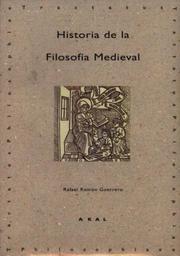| Listing 1 - 10 of 2445 | << page >> |
Sort by
|
Book
Year: 1840 Publisher: Paris : Joubert,
Abstract | Keywords | Export | Availability | Bookmark
 Loading...
Loading...Choose an application
- Reference Manager
- EndNote
- RefWorks (Direct export to RefWorks)
Book
ISBN: 2503563546 Year: 2011 Publisher: Porto : Federation Internationale des Instituts d'Etudes Medievales,
Abstract | Keywords | Export | Availability | Bookmark
 Loading...
Loading...Choose an application
- Reference Manager
- EndNote
- RefWorks (Direct export to RefWorks)

ISBN: 3896781561 9783896781567 Year: 2000 Publisher: Darmstadt: Primus,
Abstract | Keywords | Export | Availability | Bookmark
 Loading...
Loading...Choose an application
- Reference Manager
- EndNote
- RefWorks (Direct export to RefWorks)
Book
ISBN: 8422009722 8422009307 9788422009306 9788422009726 Year: 1980 Volume: 409, 418 Publisher: Madrid: La editorial catolica,
Abstract | Keywords | Export | Availability | Bookmark
 Loading...
Loading...Choose an application
- Reference Manager
- EndNote
- RefWorks (Direct export to RefWorks)
Book
ISBN: 0938060473 9780938060475 Year: 1998 Publisher: Minneapolis (Minn.): Banning press,
Abstract | Keywords | Export | Availability | Bookmark
 Loading...
Loading...Choose an application
- Reference Manager
- EndNote
- RefWorks (Direct export to RefWorks)
Book
ISBN: 9780198842408 Year: 2019 Publisher: Oxford : Oxford University Press,
Abstract | Keywords | Export | Availability | Bookmark
 Loading...
Loading...Choose an application
- Reference Manager
- EndNote
- RefWorks (Direct export to RefWorks)
"Most periods in the history of philosophy have appealing names. Putting Plato, Aristotle and friends under the heading of "classical" philosophy already highlights the unique role of ancient thought as the model and source for all that comes after. Authors like Erasmus and Machiavelli can bask in the positive connotations of the term "Renaissance.""--
Book
ISBN: 9780197266908 0197266908 Year: 2022 Publisher: Oxford Oxford university press
Abstract | Keywords | Export | Availability | Bookmark
 Loading...
Loading...Choose an application
- Reference Manager
- EndNote
- RefWorks (Direct export to RefWorks)
This is the first great commentary in the Western European tradition of expounding Aristotle's Metaphysics. Dated about 1238, this work by Richard Rufus of Cornwall is a major contribution to the history of Western philosophy and the study of Aristotle. Indeed, no future account of thirteenth century philosophical psychology will be able to ignore the contribution of Richard Rufus. Following Aristotle, Rufus addresses questions as diverse as `what is truth?' `what is matter?', what are numbers?', `how do corruptible and incorruptible substances differ?', and `how do sensible objects act on the soul?'. Its exposition of Aristotle and its exciting questions date from about 35 years before Thomas Aquinas wrote his commentary on the Metaphysics. Its publication will prompt a re-evaluation of the origins of Western metaphysics generally and the subsequent work of Thomas Aquinas. As the copious notes to this edition indicate, it was a very influential work that exercised great influence on the two most popular early Aristotle commentators, Adam Buckfield and Albert the Great.

ISBN: 9788446006732 8446006731 Year: 1996 Publisher: Madrid: Akal,
Abstract | Keywords | Export | Availability | Bookmark
 Loading...
Loading...Choose an application
- Reference Manager
- EndNote
- RefWorks (Direct export to RefWorks)
Book
ISBN: 9782760348257 2760348253 Year: 1979 Publisher: Ottawa: University of Ottawa press,
Abstract | Keywords | Export | Availability | Bookmark
 Loading...
Loading...Choose an application
- Reference Manager
- EndNote
- RefWorks (Direct export to RefWorks)
Book
ISBN: 9780919867932 0919867936 Year: 1994 Publisher: Winnipeg: Uvan,
Abstract | Keywords | Export | Availability | Bookmark
 Loading...
Loading...Choose an application
- Reference Manager
- EndNote
- RefWorks (Direct export to RefWorks)
| Listing 1 - 10 of 2445 | << page >> |
Sort by
|

 Search
Search Feedback
Feedback About UniCat
About UniCat  Help
Help News
News